SWEDISH
SOUTH ASIAN STUDIES NETWORK
Newsletter 102:
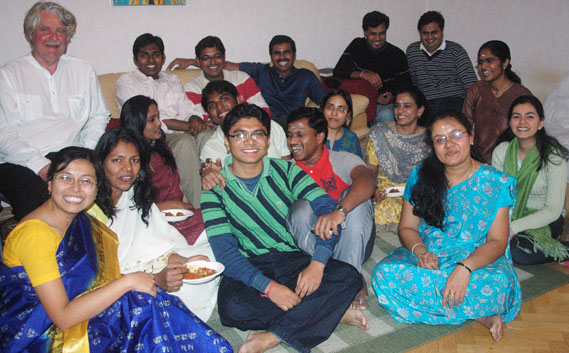 20 October 2009
20 October 2009
| Educational News |
| Lectures and seminars |
| Business and Politics |
| South Asia related Culture |
| New and updated information |
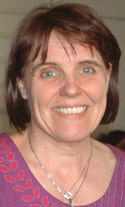 |
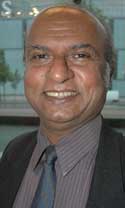 |
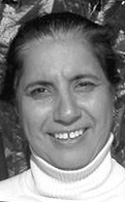 |
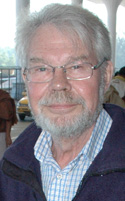 |
| Anna Lindberg | Baboo Nair | Rajni Hatti Kaul | Staffan Lindberg |
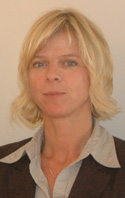 |
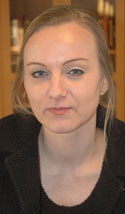 |
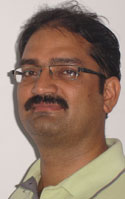 |
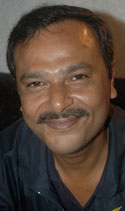 |
| Catarina Kinnvall | Kristina Myrvold | Vipin Negi | Gupinath Bhandari |
• SASNET meeting on South Asia research at Lund University
SASNET has invited Lund University Masters students, Ph.D. candidates and senior researchers interested in studies and research related to South Asia (India, Pakistan, Bangladesh, Afghanistan, Sri Lanka, Nepal, Bhutan, and Maldives) to an open meeting on
Thursday 22 October 2009, 15.15–17.00. The meeting is intended to increase the interest in pursuing South Asia related education and research at Lund University. Eminent researchers involved in South Asia related projects, including Prof. Baboo Nair, Dept. of Applied Nutrition, Prof. Staffan Lindberg, Dept. of Sociology, Prof. Rajni Hatti Kaul, Dept. of Biotechnology, Dr. Catarina Kinnvall, Dept. of Political Science, and Dr. Kristina Myrvold, Dept. of History and Anthropology of Religions, will give presentations on their work. Dr. Vipin Negi, Centre for East and South-East Asian Studies, and Dr. Gupinath Bhandari, Lund University Centre for Risk Assessment and Management (LUCRAM), will also tell about their experiences being scholarship holders through the Erasmus Mundus External Cooperation Window Programme.
After the meeting, participants are welcome to stay on for snacks and refreshments.
Registration should be done before October 20th. Venue for the meeting: Kårhuset, Hörsalen, John Ericssons väg 3, Lund. More information.
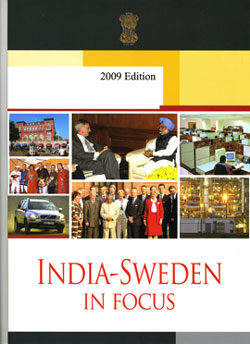 • SASNET contribution to India-Sweden in focus
• SASNET contribution to India-Sweden in focus
SASNET’s deputy director Lars Eklund has written an article about the achievements that SASNET has been able to contribute with during its nine years of existence, in the 2009 edition of the glossy magazine India-Sweden in Focus, published in mid-August. This magazine has been produced by Krest Publications in New Delhi, India, on behalf of the Embassy of India in Sweden. Besides Lars’ article entitled ”SASNET builds up Indo-Swedish collaborations”, the magazine also features articles on other important Indo-Swedish collaboration initiatives in business, research and culture. Robin Sukhia writes about the Sweden India Business Council (SIBC); Göran Baurne writes about INSTEC – the Indo-Swedish Network for Cooperation on Technical Research and Education; and Anita Nair writes about the Indo-Swedish translation project Indiska Biblioteket (Indian Library). Read the article on SASNET in India-Sweden in Focus.
• New PhD candidate representative in SASNET’s board
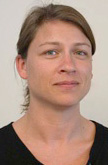 The Doctoral Student Union at Lund University has
decided to appoint PhD candidate Elenor Lissel as
member of SASNET's board, as a representative for students, especially PhD
candidates. Ms. Lissel is working on her doctoral thesis
within the field of Accounting and Tax Law at the
Faculty of Law, Lund University. The title of the
dissertation project is ”Developing Countries and
Emergency Safeguard Measures in World Trade Law”.
In 2007, she wrote a Masters thesis entitled
”Conflicts between WTO Law and EC Law – A study
on antidumping legislation and direct effect” (more information on this thesis).
The Doctoral Student Union at Lund University has
decided to appoint PhD candidate Elenor Lissel as
member of SASNET's board, as a representative for students, especially PhD
candidates. Ms. Lissel is working on her doctoral thesis
within the field of Accounting and Tax Law at the
Faculty of Law, Lund University. The title of the
dissertation project is ”Developing Countries and
Emergency Safeguard Measures in World Trade Law”.
In 2007, she wrote a Masters thesis entitled
”Conflicts between WTO Law and EC Law – A study
on antidumping legislation and direct effect” (more information on this thesis).
• Report from the Falsterbo conference now published
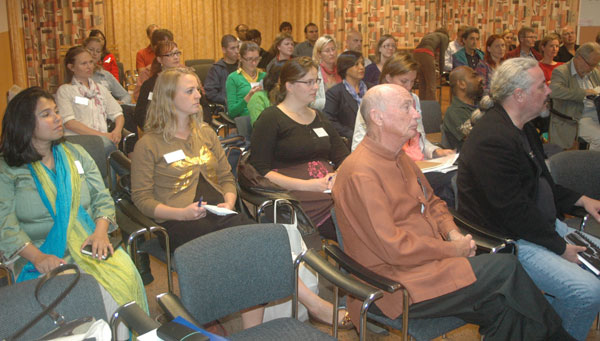 The conference report from SASNET’s conference on South Asian Studies for young Nordic scholars has now been published. The report has been compiled by Ms. Julia Velkova from the conference organising committee. Read the report (as a pdf-file).
The conference report from SASNET’s conference on South Asian Studies for young Nordic scholars has now been published. The report has been compiled by Ms. Julia Velkova from the conference organising committee. Read the report (as a pdf-file).
The conference was held at Falsterbo Kursgård in Höllviken (south of Malmö) 17-19 August 2009. The aim of the conference was to gather masters students, PhD candidates, and young post-docs in Sweden, Denmark, Finland, and Norway who focus on South Asia in their research studies.
The aim behind the conference, which was very much similar to another successful conference that SASNET organised in Marstrand in October 2002 (more information about the 2002 conference), was to provide an opportunity for young scholars to present their future and ongoing research projects, estblish contacts with colleagues in the Nordic countries, and discuss common challenges and opportunities when conducting research in South Asia related studies.
See the programme, including a list of participants (as a pdf-file). Photos from the conference.
• More information about SASNET and its
activities
See SASNET’s page, http://www.sasnet.lu.se/sasnet.html
• 44 panels accepted for the 21st ECMSAS conference in Bonn
 A total number of 44 panels have been accepted for the 21st European Conference on Modern South Asian Studies (ECMSAS), to be held in Bonn, Germany, 26–29 July 2010. The 2010 ECMSAS conference will be hosted by the University of Bonn. The ECMSAS is the largest gathering of South Asia oriented researchers in Europe, covering all fields from the humanities and social sciences to technology, natural sciences and medicine. The conference is held biannually under the aegis of the European Association of South Asian Studies (EASAS), a professional, non-profit organisation of scholars engaged in research and teaching concerning South Asia with regard to all periods and fields of study.
A total number of 44 panels have been accepted for the 21st European Conference on Modern South Asian Studies (ECMSAS), to be held in Bonn, Germany, 26–29 July 2010. The 2010 ECMSAS conference will be hosted by the University of Bonn. The ECMSAS is the largest gathering of South Asia oriented researchers in Europe, covering all fields from the humanities and social sciences to technology, natural sciences and medicine. The conference is held biannually under the aegis of the European Association of South Asian Studies (EASAS), a professional, non-profit organisation of scholars engaged in research and teaching concerning South Asia with regard to all periods and fields of study.
SASNET organised the 18th ECMSAS conference in Lund in 2004 (more information). The 2006 conference was held in Leiden, the Netherlands (read SASNET’s report); and the 2008 conference was organised by the University of Manchester, UK.
Researchers from Europe and all over the world are now invited to suggest papers for presentation at the 2010 ECMSAS conference in Bonn. Suggestions should be forwarded directly to the convener of the specific panel your paper might fit into. Conveners are free to decide whether a paper will be accepted or not. Full information on the Bonn conference web site.
Two panels are convened by Swedish scholars:
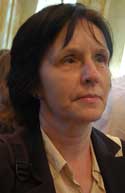 – Panel No. 23, the Bengal Studies Panel, is convened by PhD candidate Kerstin Andersson (photo), School of Global Studies/Anthropology, University of Gothenburg (along with Manjita Mukharji from SOAS in London). The ECMSAS Bengal Studies panel has through the years developed into an important forum for scholars working on Bengal and Bengali studies. As the number of scholars is quite limited and the group is scattered all over the world, the panel provides a meeting point and an opportunity to share research for all with an interest in the culture and society of West Bengal and Bangladesh – and the Bengali Diaspora worldwide. The interdisciplinary approach of the panel welcomes papers on diverse topics such as past and present, literature and media, religion and secularity, women and men, tradition and culture, and on theory and methods in a specifically Bengali context. More information about Panel 23.
– Panel No. 23, the Bengal Studies Panel, is convened by PhD candidate Kerstin Andersson (photo), School of Global Studies/Anthropology, University of Gothenburg (along with Manjita Mukharji from SOAS in London). The ECMSAS Bengal Studies panel has through the years developed into an important forum for scholars working on Bengal and Bengali studies. As the number of scholars is quite limited and the group is scattered all over the world, the panel provides a meeting point and an opportunity to share research for all with an interest in the culture and society of West Bengal and Bangladesh – and the Bengali Diaspora worldwide. The interdisciplinary approach of the panel welcomes papers on diverse topics such as past and present, literature and media, religion and secularity, women and men, tradition and culture, and on theory and methods in a specifically Bengali context. More information about Panel 23.
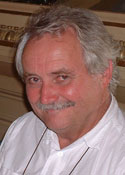 – Panel No. 37, on Confrontations in Sri Lankan politics. Origins and present developments, is convened by Prof. Peter Schalk (photo), History of Religions, Faculty of Theology, University of Uppsala. The panel focuses on the radical changes observed in Sri Lanka during the last year, with more than hundred thousand refugees being caught in the armed struggle of the Sri Lankan armed forces and the LTTE. The LTTE suffered a military defeat but at the same time a resilient Tamil Diaspora in Canada, Australia and the EU demonstrated the LTTE's defiance. Scholars are invited to elaborate on and explain the radical changes and its consequences for the economic development and for the possibilities of reconciliation for peace. More information about Panel 37.
– Panel No. 37, on Confrontations in Sri Lankan politics. Origins and present developments, is convened by Prof. Peter Schalk (photo), History of Religions, Faculty of Theology, University of Uppsala. The panel focuses on the radical changes observed in Sri Lanka during the last year, with more than hundred thousand refugees being caught in the armed struggle of the Sri Lankan armed forces and the LTTE. The LTTE suffered a military defeat but at the same time a resilient Tamil Diaspora in Canada, Australia and the EU demonstrated the LTTE's defiance. Scholars are invited to elaborate on and explain the radical changes and its consequences for the economic development and for the possibilities of reconciliation for peace. More information about Panel 37.
Among other interesting ECMSAS 2010 panels, can be mentioned Panel 2: The History of Alcohol and Drugs in Modern South Asia (18th-20th Century), convened by Dr Harald Fischer-Tiné, and Jana Tschurenev; Panel 6: Uttar Pradesh: Development Failure and Identity Politics, convened by Jens Lerche, Roger Jeffery, and Craig Jeffrey; Panel 34: Communism Compared: Andhra Pradesh and Kerala in the 1950s, convened by V Rajagopal, and Margret Frenz; and Panel 36: Taliban, Durand Line and Refugees: The Afghan-Pakistan Border Region under Stress, convened by Conrad Schetter. More information about the ECMSAS 2010 panels.
• Deadline 15 November for applications to Indo-European Erasmus Mundus mobility programme
 Applications are now invited for the Indo-European Erasmus Mundus External Cooperation Window (EMECW) lot 13 programme coordinated by Lund University.
Totally 183 scholarships will be awarded through the programme for all mobility groups (undergraduate students, masters students, PhD candidates, post-docs, and academic staff) starting in 2010 – with start dates between April 1 and September 1, 2010. Duration of the scholarships vary from 1 to 34 months.
This is one of the four Lot 13 programmes dedicated to mobility between India and the European Union, offering grants for the academic years 2010 – 2013 (more information about all the South Asia related EMECW programmes).
Applications are now invited for the Indo-European Erasmus Mundus External Cooperation Window (EMECW) lot 13 programme coordinated by Lund University.
Totally 183 scholarships will be awarded through the programme for all mobility groups (undergraduate students, masters students, PhD candidates, post-docs, and academic staff) starting in 2010 – with start dates between April 1 and September 1, 2010. Duration of the scholarships vary from 1 to 34 months.
This is one of the four Lot 13 programmes dedicated to mobility between India and the European Union, offering grants for the academic years 2010 – 2013 (more information about all the South Asia related EMECW programmes).
The application period started on 1 September 2009, and will close on 15 November. The scholarships cover travel, insurance, possible tuition, living expenses and housing costs. 75 p.c. of the mobility is from India to Europe and 25 p.c. from Europe to India. More information about the application procedure, target groups, admission requirements, and selection process.
Each university in the consortium has decided which courses they offer for scholarship holders.
Search for which courses are offered at different levels.
• Time to apply for STINT research grants
 The Swedish Foundation for International Cooperation in Research and Higher Education (STINT) supports the internationalisation of Swedish research and higher education, and encourages participation in its programmes. STINT is part of a group of Swedish research foundations that were formed in 1994. The foundation's mandate is to internationalize Swedish higher education and research. This mandate covers all academic fields and disciplines. International contacts and genuine experience working in academia abroad should be viewed as a natural and necessary feature of higher education. Currently STINT offers several types of scholarships and grants that can have relevance to South Asia related research.
The Swedish Foundation for International Cooperation in Research and Higher Education (STINT) supports the internationalisation of Swedish research and higher education, and encourages participation in its programmes. STINT is part of a group of Swedish research foundations that were formed in 1994. The foundation's mandate is to internationalize Swedish higher education and research. This mandate covers all academic fields and disciplines. International contacts and genuine experience working in academia abroad should be viewed as a natural and necessary feature of higher education. Currently STINT offers several types of scholarships and grants that can have relevance to South Asia related research.
Institutional Grants for Younger Researchers is a new programme introduced in 2008, with a purpose to expand the opportunities for especially promising young Swedish researchers to collaborate with prominent foreign research groups. The programme is aimed at young researchers who early on in their career wish to build up international cooperation with foreign colleagues in a similar position. The intention with this programme is to help to create more attractive Swedish research environments and allow for younger researchers to develop lasting international networks.
Deadline for applications for 2010 was Friday 16 October 2009. Decisions will be given by the STINT board in the beginning of 2010.
Other grants that STINT distribute are Institutional Grants for long-term collaboration between Swedish and foreign research groups, and Scholarships for Swedish doctoral candidates for doctoral studies at a foreign academic institution. Deadline for applications for both programmes for 2010-11 is 15 December 2009. Decisions will be taken in April 2010. Finally STINT distributes Networking Grants for the Humanities and Social Sciences, and Short term stipends giving an opportunity for faculty at Swedish universities to spend a maximum of three months at a foreign academic institution. These programmes can be applied for all through the year. More information about all South Asia related STINT grants.
• Call for Expressions of Interests for India-EU Study Centres Programme
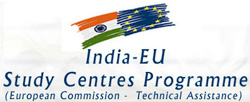 The India-EU Study Centres Programme (IESCP) now invites ”Expressions of Interests” from Indian and EU Institutions of Higher Education to strengthen existing EU Study Centres in India, and Modern India Study centres in member states of the European Union (EU). The India-EU Study Centres Programme (IESCP) was set up by the European Commission in 2008 as an integral part of the India-EU Joint Action Plan adopted in 2005. More information.
The India-EU Study Centres Programme (IESCP) now invites ”Expressions of Interests” from Indian and EU Institutions of Higher Education to strengthen existing EU Study Centres in India, and Modern India Study centres in member states of the European Union (EU). The India-EU Study Centres Programme (IESCP) was set up by the European Commission in 2008 as an integral part of the India-EU Joint Action Plan adopted in 2005. More information.
The present call for Expression of Interest (EOI) was launched on 1 October 2009. It covers the provision of international technical assistance (TA) to existing study centres in both India and EU member states. Such technical assistance is aimed at academic, adminstrative and /or instituitional capabilities so that they are better equipped to promote and sustain their teaching, research and institutional provision in terms of EU Studies in India and Modern India Studies in the EU. International technical assistance will be tailored to meet the needs of individuals centres. Deadline for the submission of applications is 30 November 2009. More information to be found in the Call for Expression submission form and guidelines. Go for the Call for Expression (as a pdf-file)
• New website for Delegation of the European Commission to India, Bhutan and Nepal
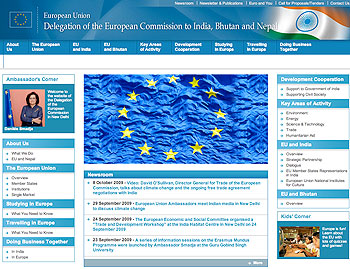 The Delegation of the European Commission to India, Bhutan and Nepal has launched a new website presenting comprehensive information on all forms of collaboration between the European Union and India, Bhutan & Nepal. For university students and researchers, useful information is found regarding the Erasmus Mundus scholarship programmes. Go to the new web page.
The Delegation of the European Commission to India, Bhutan and Nepal has launched a new website presenting comprehensive information on all forms of collaboration between the European Union and India, Bhutan & Nepal. For university students and researchers, useful information is found regarding the Erasmus Mundus scholarship programmes. Go to the new web page.
The European Commission (EC) has separate Delegations for the other South Asian countries. They have all informative web pages:
| EC Delegation to Afghanistan | EC Delegation to Bangladesh |
| EC Delegation to Pakistan | EC Delegation to Sri Lanka and the Maldives |
• Third NSU workshop on South Asia in the 21st Century in Falsterbo
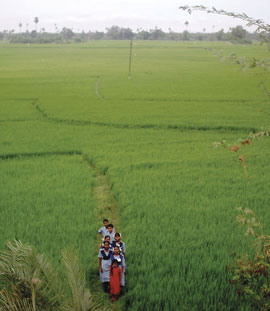 The third workshop in the Nordic Summer University (NSU) project on ”South Asia in the 21st Century: Explorations in Multidisciplinary Methodology” will be held at Falsterbo, south of Malmö, Sweden, 2–3 February 2010. The topic is ”Environmental
Challenges, Politics and Food Production in South Asia”. A Call for papers from Nordic researchers has now been published.
The third workshop in the Nordic Summer University (NSU) project on ”South Asia in the 21st Century: Explorations in Multidisciplinary Methodology” will be held at Falsterbo, south of Malmö, Sweden, 2–3 February 2010. The topic is ”Environmental
Challenges, Politics and Food Production in South Asia”. A Call for papers from Nordic researchers has now been published.
The workshop will focus on looking into the question of food production
under changing conditions in South Asia. Those conditions are presently
characterised by uncertainty, since we do not have models for future
climate change on the local level as yet, and since we do not know what
will be the position of South Asian countries in the coming WTO
negotiations of world food trade liberalisation. One of the goals of the
workshop is to analyse strategies for research into the politics of food
production. To this end the organizers of the workshop will invite
participation not only from rural sociologists/anthropologists and human
geographers, but also scholars working on state and national politics as
well as political capacity in South Asia. NSU hopes to fund accommodation and travel costs for 12 paper presenters. Candidates should send their abstracts (not more than half a page) of your proposed presentation to Ingfrid Knudegaard by Wednesday 21 October 2009. Full papers should be delivered by 5
January 2010.
The Falsterbo workshop can be seen as part of the on-going effort to establish a Nordic Network on the Study of Environmental Challenges in South Asia. If you would like to join the network, please send an e-mail to Prof. Pamela Price, University of Oslo, and indicate the nature of your interest(s). Prof. Price is one or three Nordic researchers that constitute the organizing committeee for the Falsterbo workshop, the others being Dr. Pernille Gooch, Lund University, and Prof. Tor Aase, University of Bergen.
![]() ”South Asia in the 21st Century: Explorations in Multidisciplinary Methodology” is one of the themes for the Nordic Summer University (NSU) programme during the period 2009–11. For more than 50 years NSU has been known to develop academic and intellectual debates that has involved several leading intellectuals, politicians, and scholars of the Nordic countries. The organization is sponsored by the Nordic Council of Ministers.
The Falsterbo workshop is the third out of six workshops that are being held within the South Asia theme.
A cluster of Nordic researchers in South Asian studies prepared a proposal for these multidisciplinary NSU seminars that was accepted in 2007. The aim was to connect presently dispersed scholars on South Asian studies and upgrade the existing mass of Nordic PhD students and younger researchers in the Nordic Summer University activities. Read the full proposal for the South Asia in the 21st Century NSU programme.
”South Asia in the 21st Century: Explorations in Multidisciplinary Methodology” is one of the themes for the Nordic Summer University (NSU) programme during the period 2009–11. For more than 50 years NSU has been known to develop academic and intellectual debates that has involved several leading intellectuals, politicians, and scholars of the Nordic countries. The organization is sponsored by the Nordic Council of Ministers.
The Falsterbo workshop is the third out of six workshops that are being held within the South Asia theme.
A cluster of Nordic researchers in South Asian studies prepared a proposal for these multidisciplinary NSU seminars that was accepted in 2007. The aim was to connect presently dispersed scholars on South Asian studies and upgrade the existing mass of Nordic PhD students and younger researchers in the Nordic Summer University activities. Read the full proposal for the South Asia in the 21st Century NSU programme.
The first workshop was held in Copenhagen 13–15 March 2009. The theme was ”Democratic Values and Political Practices in South
Asia”, and it was coordinated by
Stig Toft Madsen, SASNET; Kenneth B Nielsen, University of Oslo; and Arild Engelsen Ruud, also University of Oslo. Full information about the March 2009 workshop, including a list of papers presented.
The second workshop was held in Tyrifjord, Norway, 19–26 July 2009. The theme for this workshop was ”South Asian Migration and Diaspora”, and it was coordinated by Peter B. Andersen, University of Copenhagen; Knut A. Jacobsen, University of Bergen; Igor Kotin, Kunstkamera, St. Petersburg, Russia; and Marianne
Qvortrup Fibiger, University of Aarhus.
Later workshops in the NSU seminar series will focus on ”Religion and conflict in South Asia” in the summer 2010; on ”Releasing the Indian tiger – economical and political
implications globally and regionally of the opening of the Indian economy” in the winter 2010/11; and a final workshop in the summer 2011 on a theme not yet decided upon.
• Nobel Memorial Prize in Economic Sciences to Elinor Ostrom
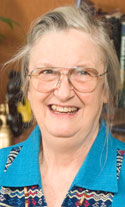 Prof. Elinor Ostrom, Arthur F. Bentley Professor of Government, Indiana University, Bloomington, USA, has been awarded the 2009 Nobel Memorial Prize in Economic Sciences (sharing the prize with Oliver E. Williamson). Prof. Ostrom is the first woman to win the prize in this category. She is considered one of the leading scholars in the study of common pool resources. In particular, Ostrom's work emphasizes how humans interact with ecosystems to maintain long-term sustainable resource yields. Common pool resources include many forests, fisheries, oil fields, grazing lands, and irrigation systems. Her current work emphasizes the multifaceted nature of human–ecosystem interaction and argues against any singular ”panacea” for individual social-ecological system problems. She has a Swedish connection in the fact that she has been a member of the Expert Group on Development Issues, EGDI (on behalf of the Swedish Ministry of Foreign Affairs).
Prof. Elinor Ostrom, Arthur F. Bentley Professor of Government, Indiana University, Bloomington, USA, has been awarded the 2009 Nobel Memorial Prize in Economic Sciences (sharing the prize with Oliver E. Williamson). Prof. Ostrom is the first woman to win the prize in this category. She is considered one of the leading scholars in the study of common pool resources. In particular, Ostrom's work emphasizes how humans interact with ecosystems to maintain long-term sustainable resource yields. Common pool resources include many forests, fisheries, oil fields, grazing lands, and irrigation systems. Her current work emphasizes the multifaceted nature of human–ecosystem interaction and argues against any singular ”panacea” for individual social-ecological system problems. She has a Swedish connection in the fact that she has been a member of the Expert Group on Development Issues, EGDI (on behalf of the Swedish Ministry of Foreign Affairs).
In September 2001, Elinor Ostrom was a keynote speaker at a SASNET symposium and workshop held in Lund on ”Managing Common Resources – What is the solution?” (co-organised by the Dept. of Economy, and Dept. of Sociology at Lund University).
More information about the 2001 symposium.
• Gothenburg Centre for Globalization and Development launched
 A Centre for Globalization and Development (CGD) was launched at Gothenburg University in July 2009. This transdisciplinary initiative has a base grant of SEK 7.5 million per year during three years, and has a steering committee with representatives from many departments at Gothenburg University. The Centre aims to promote research on how globalization processes affect development in the global South, and seeks to identify appropriate domestic and international policy responses. The interrelated processes that are analyzed are the economic process of international economic integration, the political process of global governance, and the social and cultural processes of increased global interaction. How these processes affect development in countries in the South depends on its resources, institutions, and policies as well as the ability to deal with conflicts and environmental challenges.
A Centre for Globalization and Development (CGD) was launched at Gothenburg University in July 2009. This transdisciplinary initiative has a base grant of SEK 7.5 million per year during three years, and has a steering committee with representatives from many departments at Gothenburg University. The Centre aims to promote research on how globalization processes affect development in the global South, and seeks to identify appropriate domestic and international policy responses. The interrelated processes that are analyzed are the economic process of international economic integration, the political process of global governance, and the social and cultural processes of increased global interaction. How these processes affect development in countries in the South depends on its resources, institutions, and policies as well as the ability to deal with conflicts and environmental challenges.
The Centre supports research on the following six themes:
1. International Integration and Development in the South
2. The International Organization of Production
3. Global Social Relations
4. Peace, Development and Security
5. Environmental Sustainability and Climate Change
6. Global Governance
CGD now invites applications for four postdoctoral research fellowships for an initial period of 1 to 2 years with possibility of extension. Apart from persons who have completed their PhDs within the last three years, students who are near completion of their thesis are also welcome to apply. Deadline for submission is 1 December 2009. More information.
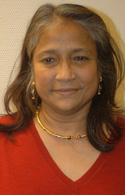 The Centre also invites to an Inaugural Conference on ”Globalization and Development”, to be held
29–30 October 2009 in Gothenburg. The participants include Prof. Jan Scholte,
Centre for the Study of Globalisation and Regionalisation, University of Warwick, UK, who will talk about “Building Global Democracy? Civil Society and Accountable Global Governance”; and Professor Naila Kabeer (photo),
Institute of Development Studies, University of Sussex, UK, who will talk about “Changing Patterns of Motherhood, Marriage and Masculinity in the Context of Globalization”. Venue: Linnésalen, Campus Linné, Mediehuset, Seminariegatan 1 B, Gothenburg. As a side event, there will be held a seminar for PhD candidates and post-docs with short presentations of ongoing research and informal discussions about opportunities for research collaboration across disciplinary boundaries. More information about the conference.
The Centre also invites to an Inaugural Conference on ”Globalization and Development”, to be held
29–30 October 2009 in Gothenburg. The participants include Prof. Jan Scholte,
Centre for the Study of Globalisation and Regionalisation, University of Warwick, UK, who will talk about “Building Global Democracy? Civil Society and Accountable Global Governance”; and Professor Naila Kabeer (photo),
Institute of Development Studies, University of Sussex, UK, who will talk about “Changing Patterns of Motherhood, Marriage and Masculinity in the Context of Globalization”. Venue: Linnésalen, Campus Linné, Mediehuset, Seminariegatan 1 B, Gothenburg. As a side event, there will be held a seminar for PhD candidates and post-docs with short presentations of ongoing research and informal discussions about opportunities for research collaboration across disciplinary boundaries. More information about the conference.
• PUKAR offers youth fellowships and research fellowships
 PUKAR (Partners for Urban Knowledge, Action and Research) based in Mumbai, India, is an innovative and experimental initiative that aims to contribute to a global debate about urbanization and globalization. The organisation supports a number of multi-disciplinary projects with research and expositionary dimensions. Its research activities are collaborative, cross-disciplinary initiatives involving two or more Associates, working out of different professional and disciplinary backgrounds. The projects currently supported by PUKAR involve a complex mix of traditional and non-traditional methods, positing documentation and resource-building as forms of intervention. They include projects on ”Gender and Space” (funded by the Indo-Dutch Programme on Alternatives in Development
2003–2006); and ”Post Industrial Landscapes”.
PUKAR (Partners for Urban Knowledge, Action and Research) based in Mumbai, India, is an innovative and experimental initiative that aims to contribute to a global debate about urbanization and globalization. The organisation supports a number of multi-disciplinary projects with research and expositionary dimensions. Its research activities are collaborative, cross-disciplinary initiatives involving two or more Associates, working out of different professional and disciplinary backgrounds. The projects currently supported by PUKAR involve a complex mix of traditional and non-traditional methods, positing documentation and resource-building as forms of intervention. They include projects on ”Gender and Space” (funded by the Indo-Dutch Programme on Alternatives in Development
2003–2006); and ”Post Industrial Landscapes”.
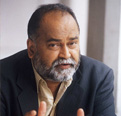 PUKAR’s team consists of a group of scholars, social and cultural activists and professionals in the fields of art, journalism, film, architecture, urban planning and social sciences. The organization was founded in 2001 by Professor Arjun Appadurai (photo), Senior Vice-President for Global Initiatives, New School University, New York, USA, who serves as the President of its Board of Trustees.
PUKAR’s team consists of a group of scholars, social and cultural activists and professionals in the fields of art, journalism, film, architecture, urban planning and social sciences. The organization was founded in 2001 by Professor Arjun Appadurai (photo), Senior Vice-President for Global Initiatives, New School University, New York, USA, who serves as the President of its Board of Trustees.
Among PUKAR initiatives should be mentioned a Youth Fellowship Programme, and its PUKAR Advanced Level Research Fellowship Programme. The latter aims at producing urban
research outside of academia, by youth fellows on themes directly
relevant to their personal interests.
• Call for Contributors: Global Environmental History
Facts on File, a US-based award-winning publisher of print and online reference materials for the school and library market, announces the preparation of a new general reference, Encyclopedia of Global Environmental History. It will be published under the General Editorship of Brian Black, Professor of History and Environmental Studies at Pennsylvania State University in Altoona, USA. In particular, this volume is organized around specific issues, events, or people that have been contingent in patterns of world environmental history. Potential contributors are encouraged to send brief cv‘s with a description of your specific area of specialization/interest. Facts on File will then supply an up-to-date selection of possible topics. Each entry will be signed and contributors will be paid a small honorarium upon publication. Send correspondence to: bbfof@atlanticbb.net
• South Asian Studies Council, Yale, announces post-doc positions
 The South Asian Studies Council (SASC) at the MacMillan Center invites applications for post-doctoral positions at Yale University for the academic year 2010-2011. The Council expects to make up to three appointments with the possibility of a one-year renewal. Candidates must have research and teaching experience relevant to modern and contemporary South Asia, in the humanities or social sciences; have in-depth knowledge of at least one SA-related language and fluency in English; and must have completed the PhD by the time of appointment. The post-doctoral fellow will teach one course in each of two terms related to his/her interests, pursue his/her own research, and participate in the activities of the South Asian Studies Council.
Applications will be accepted immediately with review beginning on January 5, 2010 and continuing until the selections are final. More information.
The South Asian Studies Council (SASC) at the MacMillan Center invites applications for post-doctoral positions at Yale University for the academic year 2010-2011. The Council expects to make up to three appointments with the possibility of a one-year renewal. Candidates must have research and teaching experience relevant to modern and contemporary South Asia, in the humanities or social sciences; have in-depth knowledge of at least one SA-related language and fluency in English; and must have completed the PhD by the time of appointment. The post-doctoral fellow will teach one course in each of two terms related to his/her interests, pursue his/her own research, and participate in the activities of the South Asian Studies Council.
Applications will be accepted immediately with review beginning on January 5, 2010 and continuing until the selections are final. More information.
• Rutgers seeks associate professor in classical/modern South Asian literatures
The Department of African, Middle Eastern and South Asian Languages and Literatures at the School of Arts and Sciences on the New Brunswick campus of Rutgers University, invites applications for a tenure-track, open rank position at the level of assistant or associate professor in the field of classical/modern South Asian literatures beginning Fall 2010. Native or near-native proficiency in one South Asian language is required. The ideal candidate will have a record of publications on classical and/or modern South Asian literatures. The position will involve designing and teaching courses on South Asian literatures in translation, as well as coordinating, once in about every four years, a team-taught course on the literatures of Africa, the Middle East and South Asia. Experience in teaching a South Asian language would be an added advantage. Review of applications will begin on November 30, 2009. More information.
• Assistant Professor in South Asian Languages and Literature wanted in Buffalo
The State University of New York in Buffalo, USA, announces a position as Assistant Professor in South Asian Languages and Literature. Candidates must have a PhD in hand at the time of appointment (August 2010) and provide evidence of excellence in scholarly achievement and teaching. The appointment will be made initially in an appropriate existing department, pending the expected creation of a department of Asian studies that the successful candidate will join. The position requires teaching South Asian literature courses at the undergraduate and graduate levels, guiding the expansion of South Asian language instruction, and possibly some teaching of advanced Hindi/Urdu. Research specialty is open, but concentration on Hindi/Urdu literature is strongly preferred. Collaboration with South Asianists in various departments to strengthen the South Asian component of the Asian studies program and establish a South Asia Institute at the university will be required. Reviewing of the applications will start on December 4, 2009. More information.
• More information about South Asia related
research at Swedish and Nordic universities
See SASNET’s page, http://www.sasnet.lu.se/research.html
• KULTURSTUDIER offers semester courses in Peace
and Conflict Studies in Puducherry
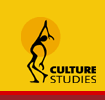 Twice a year KULTURSTUDIER
(Culture Studies) offers a full semester course (30 ECTS) in Peace
and Conflict Studies, to be carried out in Puducherry
on the southeastern coast of India. KULTURSTUDIER is
an organisation run by a group of social scientists and humanists
whose background is from the University of Oslo. Since 1997
it provides the opportunity to combine studies of high academic
standard in an environment that offers great learning experiences
in third world countries, including India. The Puducherry course is run in cooperation
with Oslo University College and Vestfold
University College. It is offered
twice per year, starting in August and January. The course gives a broad interdisciplinary introduction to the study of social and political processes of conflict and conflict resolution on a local, regional and global scale. Students and teachers come from all over the world. 10 weeks of studies in India are preceded by 5 weeks of self-study with internet-based supervision.
Twice a year KULTURSTUDIER
(Culture Studies) offers a full semester course (30 ECTS) in Peace
and Conflict Studies, to be carried out in Puducherry
on the southeastern coast of India. KULTURSTUDIER is
an organisation run by a group of social scientists and humanists
whose background is from the University of Oslo. Since 1997
it provides the opportunity to combine studies of high academic
standard in an environment that offers great learning experiences
in third world countries, including India. The Puducherry course is run in cooperation
with Oslo University College and Vestfold
University College. It is offered
twice per year, starting in August and January. The course gives a broad interdisciplinary introduction to the study of social and political processes of conflict and conflict resolution on a local, regional and global scale. Students and teachers come from all over the world. 10 weeks of studies in India are preceded by 5 weeks of self-study with internet-based supervision.
The collaboration with with Oslo University College makes it possible to issue Internationally transferable university credits. The course is suitable for both for students who wish to include the discipline of peace studies as a part of a bachelor degree, and professionals (teachers, diplomats, etc.) and others who seek further education in international and multicultural issues. Full
information about the course.
Swedish students are welcome to participate. Information meetings are therefore held at several Swedish universities (Stockholm, Uppsala, Lund, Malmö, Linköping, Sundsvall) during the fall 2009.
Go for the schedule of the information meetings.
• PILC introduces Tamil Winter School in Puducherry
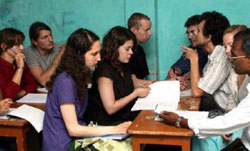 The Puducherry
(Pondicherry) Institute of Linguistics and Culture (PILC) organises an intensive three-weeks Tamil Winter School (TWS) 2009.
It will be held 30 November – 19 December 2009. PILC has been organising Tamil Summer Schools (TSS) since 2004. Read an article from The Hindu about the Tamil Summer School 2008, (with a photo by T. Singaravelou).
The Puducherry
(Pondicherry) Institute of Linguistics and Culture (PILC) organises an intensive three-weeks Tamil Winter School (TWS) 2009.
It will be held 30 November – 19 December 2009. PILC has been organising Tamil Summer Schools (TSS) since 2004. Read an article from The Hindu about the Tamil Summer School 2008, (with a photo by T. Singaravelou).
In response to the request from various quarters PILC now introduces also a Tamil Winter School (TWS) from this year i.e. 2009. The level of course offered for the 2009 TWS is BASIC. The medium of teaching will be English. The TWS focuses on
Spoken Tamil rather than on the classical and written forms
being taught in European Universities. More
information on the Tamil Winter School 2009 (as a pdf-file).
 • Overseas Development Group courses for development professionals
• Overseas Development Group courses for development professionals
The Overseas Development Group (ODG), a charitable company
wholly owned by the University of East Anglia, Norwich,
UK, regularly organizes short courses for development
professionals, some of them during the Spring–Summer 2010,
on subjects like ”Climate Change and Development” (September); ”Management Information Systems for M&E” (16–27 August); ”Monitoring and Evaluating for Development Activities” (dates still to be decided); and a number of other Professional Development Programmes.
More
information about the ODG professional courses 2010.
• Fifth International Summer School for Jaina Studies in India
 The International Summer School for Jain Studies (ISSJS) now admits applications for its fifth two months
long residential summer school in North India for the summer 2010 (May to July). During this period, ISSJS students will spend most of their time studying in Mumbai & North Indian cities of New Delhi, Jaipur, Varanasi and other cities of importance for Jainism.
In addition to the daily lecture schedules, community interaction and independent study projects, the ISSJS will provide language tutorials for students already engaged in the study of Hindi/Sanskrit/Prakrit. Tutorials will be based on student requests for five out of the seven weeks of the program. ISSJS was established in 2005 with an aim to take the academic studies of Jainism to the
universities of North America primarily. More than 120 scholars and students
from 9 countries and more than 20 universities of the world have attended
the last 4 ISSJSs. In addition to class room lectures by eminent scholars
of Jainism, the program also features meetings and
interactions with the Jain professionals , practitioners, monks, nuns and
visits to temples, historical and architectural places. The emphasis is on
the study and learning of philosophy, art , history and culture of the
Jains. Another advantage of the program is that nearly full cost (except $400-500) of the program such as tuition, course material, boarding
and lodging in India for the entire stay are paid for by ISSJS to all
participants. More information.
The International Summer School for Jain Studies (ISSJS) now admits applications for its fifth two months
long residential summer school in North India for the summer 2010 (May to July). During this period, ISSJS students will spend most of their time studying in Mumbai & North Indian cities of New Delhi, Jaipur, Varanasi and other cities of importance for Jainism.
In addition to the daily lecture schedules, community interaction and independent study projects, the ISSJS will provide language tutorials for students already engaged in the study of Hindi/Sanskrit/Prakrit. Tutorials will be based on student requests for five out of the seven weeks of the program. ISSJS was established in 2005 with an aim to take the academic studies of Jainism to the
universities of North America primarily. More than 120 scholars and students
from 9 countries and more than 20 universities of the world have attended
the last 4 ISSJSs. In addition to class room lectures by eminent scholars
of Jainism, the program also features meetings and
interactions with the Jain professionals , practitioners, monks, nuns and
visits to temples, historical and architectural places. The emphasis is on
the study and learning of philosophy, art , history and culture of the
Jains. Another advantage of the program is that nearly full cost (except $400-500) of the program such as tuition, course material, boarding
and lodging in India for the entire stay are paid for by ISSJS to all
participants. More information.
• Information about South Asia related
education at Swedish and Nordic universities
See SASNET’s page, http://www.sasnet.lu.se/education.html
• Varanasi seminar on Repositioning ‘Subalternity’ in globalized India
A National Indian Seminar
on “Repositioning ‘Subalternity’ in globalized India:
The Dynamics of Social Inclusion” will be held in Varanasi, India,
19–21 November 2009. The conference is organized by the Centre for Study of Social Exclusion and Inclusive Policy at
Banaras Hindu University (BHU). The aim is to build partnerships within the academia on behalf of groups which identify or experience strcutural discrimination and marginalization so as to develop parameters of exclusion and models of socal inclusion. It would also facilitate in uncovering the nuances of contemporary agenda’s of equality and how it has responded to the challenges of differentiation on grounds of disability, gender, age, race, sexual oreintation, religion with the help of believe in implementation of state policies of social inclusivity. More information.
• Delhi conference on Region Formation in Contemporary South Asia
An international conference on ”Region Formation in Contemporary South Asia” will be held at the University of Delhi, India, 25–27 November 2009. This interdisciplinary conference seeks to promote discussion of the
economic and political significance of regions in the subcontinent.
The conference focuses upon two important observations of contemporary
South Asia. The first is that relations of production, exchange and
'kinship' (including those of caste, tribe and gender) continue to
have significant spatial variation. The second observation is that asymmetry exists between region
boundaries and the superimposition of administrative units. The
conference is interested in the peculiarities of how regions and state
administrative units relate, given the perpetuation of regions and
highly geographically uneven development throughout South Asia. The opening address will be given by Professor David Seddon, author of
many important works on Third World social formations. The conference builds upon the 2008 conference 'The Character & Trajectory of the Indian
Economic Formation in an Era of Globalisation'.
Executive organisers are Kumar Sanjay Singh and Simon Chilvers. More information.
• Leiden workshop on Changing Governance in Asia
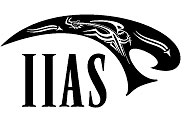 A Young Scholars Workshop on ”Changing Governance in Asia” will be held in
Leiden, the Netherlands, 26–27 November 2009. The workshop is organised by the newly established IIAS (International Institute for Asian Studies) Centre for Regulation and Governance. Young scholars in their early stage of academic career are invited to participate in a workshop that offers an opportunity to present new research initiatives, to get feedback for project plans, and to exchange views on research frontiers. Researchers with an outstanding project proposal will have the possibility of receiving a post-doc fellowship at the Centre. More information.
A Young Scholars Workshop on ”Changing Governance in Asia” will be held in
Leiden, the Netherlands, 26–27 November 2009. The workshop is organised by the newly established IIAS (International Institute for Asian Studies) Centre for Regulation and Governance. Young scholars in their early stage of academic career are invited to participate in a workshop that offers an opportunity to present new research initiatives, to get feedback for project plans, and to exchange views on research frontiers. Researchers with an outstanding project proposal will have the possibility of receiving a post-doc fellowship at the Centre. More information.
• Tübingen workshop on The Jaina and the British
An international workshop on ”The Jaina and the British.
Collaboration and Conflict, Concealment and Contribution during the 19th and early 20th century” will be held in Tübingen, Germany, 19–20
February 2010. It is organised by the Dept. of Indology and Comparative Religion, Institute of Asian and Oriental Studies (AOI),
University of Tübingen. Issues to focus on will be for example why Jaina entrepreneurs were among the most successful middlemen on behalf of the British East India Company, and the Empire? How did these successful Jaina invest their profits for religious or for social purposes? Are the life histories of influential Jaina merchants exceptional or do they reflect the general history of their local communities? To what extent do recent Jaina demands for the legal acknowledgement of their minority status refer to findings of the late 19th century scholars? Participants who like to present papers should register before 30 October 2009, participants without presentations before 30 November. Venue for the workshop: Castle Hohentübingen. Full information.
• Delhi seminar on Geographical approaches to Studying Gender in Asia
An international seminar on ”Contextualizing Geographical approaches to Studying Gender in Asia” will be held at the University of Delhi on 3–5 March 2010. It will be organised by the Dept. of Geography, Delhi School of Economics, in collaboration with the College of Asia and the Pacific at Australian National University (ANU). The seminar also has the support of International Geographical Union (IGU) commission on Gender and Geography. Apart from providing a forum for Asian geographers to critically examine the contexts that shape their work on gender, the seminar also aims to initiate a productive dialogue between them and other Asian feminists as well as those based overseas. Deadline for subnission of abstracts is 15 November 2009. More information.
• Papers invited for Yale
Modern South Asia Workshop
2010
 The Yale
Modern South Asia Workshop
2010 will be held 10–11 April 2010 in New Haven, Connecticut, USA. The conference is sponsored by the South Asian Studies Council at the Whitney and Betty MacMillan Center for International and Area Studies at Yale. It will feature the ongoing work of advanced graduate students, postdoctoral scholars and junior scholars who challenge theoretical and/or methodological conventions. The workshop will bring together a community of young scholars for interdisciplinary conversation on topics of current interest in modern South Asian studies. Papers from all disciplines in the Humanities and Social Sciences will be presented, particularly those that will foster cross-disciplinary dialogue and exchange within the larger area studies rubric of South Asia. Session organization will reflect the subject matter. Past papers included issues of gender, films, ethnomusicology and space.
Abstracts should be submitted before 1 November 2009. More information.
The Yale
Modern South Asia Workshop
2010 will be held 10–11 April 2010 in New Haven, Connecticut, USA. The conference is sponsored by the South Asian Studies Council at the Whitney and Betty MacMillan Center for International and Area Studies at Yale. It will feature the ongoing work of advanced graduate students, postdoctoral scholars and junior scholars who challenge theoretical and/or methodological conventions. The workshop will bring together a community of young scholars for interdisciplinary conversation on topics of current interest in modern South Asian studies. Papers from all disciplines in the Humanities and Social Sciences will be presented, particularly those that will foster cross-disciplinary dialogue and exchange within the larger area studies rubric of South Asia. Session organization will reflect the subject matter. Past papers included issues of gender, films, ethnomusicology and space.
Abstracts should be submitted before 1 November 2009. More information.
• Roskilde workshop on Study of Local Politics in Developing Countries
A PhD Workshop on ”Theoretical and Methodological Approaches to the Study of Local Politics in Developing Countries” will be held at Roskilde University (RUC) in Denmark, 5–7 May 2010. It is organised by the Graduate School of International Development Studies at RUC. The workshop develops and discusses the theoretical and methodological aspects of studying local politics in developing countries with the aim of covering a wide range of social science issues, among others decentralisation, democratisation, resources access and control, conflict occurrences, migrations, border issues and the configuration of local powers. Common to all these themes are how a good researcher strives to produce worthy, original and insightful work where there is perhaps already an abundance of existing literature. Deadline for the PhD student to send applications is 1 November 2009. Venue: Bymose Hegn, Helsinge. More information.
• Singapore workshop on Marital Dissolution in Asia
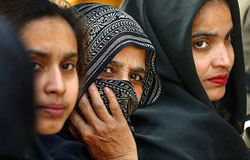 A Workshop on ”Marital Dissolution in Asia” will be held in Singapore 6–7 May 2010. It is organised by the Asia Research
Institute at the National University of Singapore (NSU). The workshop focuses on the wide diversity of patterns in both marital
formation and marital dissolution in Asia. Though there has been some work on
recent changes in marriage patterns, marital dissolution in the Asian
context has not received much critical attention. In the less wealthy countries of Asia, divorce rates have varied
tremendously in the past, from very low rates in South Asian countries to
very high rates in the Malay-Muslim populations of Southeast Asia. It is
only when the traditional marriage and kinship systems in these countries
are understood, along with the pressures under which they are placed by
social and economic developments, that trends in divorce can be
understood. Paper proposals should be submitted by 23 November 2009.
Venue: ARI Seminar Room,
Tower Block Level 10, 469A Bukit Timah Road,
National University of Singapore. More information.
A Workshop on ”Marital Dissolution in Asia” will be held in Singapore 6–7 May 2010. It is organised by the Asia Research
Institute at the National University of Singapore (NSU). The workshop focuses on the wide diversity of patterns in both marital
formation and marital dissolution in Asia. Though there has been some work on
recent changes in marriage patterns, marital dissolution in the Asian
context has not received much critical attention. In the less wealthy countries of Asia, divorce rates have varied
tremendously in the past, from very low rates in South Asian countries to
very high rates in the Malay-Muslim populations of Southeast Asia. It is
only when the traditional marriage and kinship systems in these countries
are understood, along with the pressures under which they are placed by
social and economic developments, that trends in divorce can be
understood. Paper proposals should be submitted by 23 November 2009.
Venue: ARI Seminar Room,
Tower Block Level 10, 469A Bukit Timah Road,
National University of Singapore. More information.
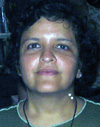 |
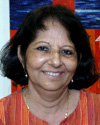 |
| Bishnupriya Ghosh. | Himanshu Ray. |
• Nordic Association for South Asian Studies conference in Helsinki
 After a gap of five years, the Nordic Association for South Asian Studies, NASA, arranges a conference and a PhD workshop 26–29 May 2010 in Helsinki, Finland. The theme for the conference will be ”Globalizing South Asia”, and it is organised by the University of Helsinki. The conference aims to bring scholars from
different fields within humanities and social sciences (history, anthropology, sociology, economics,
geography, environmental science, development studies and political science)
together to analyze cultural, economic, political and environmental
connections in South Asia. Both Nordic
and non-Nordic scholars are invited to participate in the conference that is meant to stimulate
networking and exchange, and to create a forum for discussions for
scholars and doctoral students within and outside the Nordic countries. The
deadline for panel proposals is by 30 October 2009 and for abstracts of
papers by 31 January 2010 by e-mail to both the convenors, Dr. Sirpa Tenhunen, and Dr. Klaus Karttunen.
After a gap of five years, the Nordic Association for South Asian Studies, NASA, arranges a conference and a PhD workshop 26–29 May 2010 in Helsinki, Finland. The theme for the conference will be ”Globalizing South Asia”, and it is organised by the University of Helsinki. The conference aims to bring scholars from
different fields within humanities and social sciences (history, anthropology, sociology, economics,
geography, environmental science, development studies and political science)
together to analyze cultural, economic, political and environmental
connections in South Asia. Both Nordic
and non-Nordic scholars are invited to participate in the conference that is meant to stimulate
networking and exchange, and to create a forum for discussions for
scholars and doctoral students within and outside the Nordic countries. The
deadline for panel proposals is by 30 October 2009 and for abstracts of
papers by 31 January 2010 by e-mail to both the convenors, Dr. Sirpa Tenhunen, and Dr. Klaus Karttunen.
The keynote speakers will be Professor Steve Derne, State University of New York at Geneseo, USA; Prof. Bishnupriya Ghosh, University of California, Santa Barbara, USA; Prof. William Mazzarella, University of Chicago, USA; and Prof. Himanshu Rai, Centre for Historical Studies, Jawaharlal Nehru University (JNU), India. A peer-reviewed volume of selected papers will be published after the
conference.
Full information about the 2010 NASA conference.
• Oxford workshop on Scholarly Networks in the British Empire
A workshop on ”Scholarly Networks in the British Empire” will be held in Oxford, UK, 5–6 July 2010. The workshop will provide a forum to consider the relationships that existed between scholars and universities located in different parts of Britain and the Empire in the years after 1850. By examining the historical lineages of these networks, it seeks a critical understanding of the processes that helped to shape the topographies of today’s entangled scholarly community. Proposals for papers should be submitted before 31 December 2009. Venue: Wadham College,
Parks Road,
Oxford. More information.
• Other conferences connected to South Asian
studies arranged all over the World
See SASNET’s page, http://www.sasnet.lu.se/conferences.html#conf
Important lectures and seminars in Scandinavia
• Arnvig’s new film to be screened at Afghanistan seminars
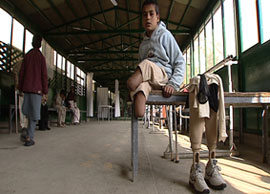 The Danish journalist Eva Arnvig participates in a number of seminars on Afghanistan in Skåne during the period 20–27 October 2009. Ms. Arnvig’s new documentary film ”Children of War” will be screened, and will be followed by discussions. The film shows how children are severely affected by the current war in Afghanistan. It pictures Afghan children, their life and background and some of the people deeply involved in helping children victimised by war. The film has been shot in in several locations in Afghanistan from Tora Bora to Kabul.
The Danish journalist Eva Arnvig participates in a number of seminars on Afghanistan in Skåne during the period 20–27 October 2009. Ms. Arnvig’s new documentary film ”Children of War” will be screened, and will be followed by discussions. The film shows how children are severely affected by the current war in Afghanistan. It pictures Afghan children, their life and background and some of the people deeply involved in helping children victimised by war. The film has been shot in in several locations in Afghanistan from Tora Bora to Kabul. 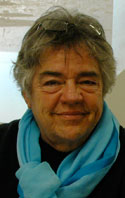
Eva Arnvig is not only an experienced journalist but also a clinical psychologist. She has worked for 18 years for UN organisations such as UNDP (United Nations Development Programme), and has travelled extensively in Asia, not the least in Afghanistan.
In 2002 she received the Media Communications Association (MCA) Gold Award for the documentary ”Children of Allah”, about everyday life in the Haqqania madrassah in Pakistan. The new film has been produced with support from DANIDA, Danish Red Cross, Danish Demining, AHRO (Afghan Human Rights Organization) and Dacaar.
The seminars are jointly organised by Afghanistansolidaritet, local committees of UNA-Sweden (FN-förbundet), and ABF.
Schedule for the seminars:
– Malmö: Tuesday 20 October, 18.30. Venue: Mosaiken, Porslinsgatan 3.
– Lund: Wednesday 21 October, 18.30. Venue: Brf Gasverkets samlingslokal, Trollebergsvägen 7.
– Kristianstad. Monday 26 October, 18.30. Venue: ABF, Fackens hus, Kanalgatan 94.
– Helsingborg: Tuesday 27 October, 17.30. Venue: Stadsbiblioteket.
More information.
• Lund University lunch seminar with Swati Banerjee
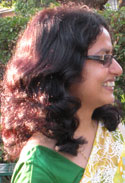 Dr. Swati Banerjee, Centre for Community Organisation and Development Practice (CODP),
School of Social Work, Tata Institute of Social Sciences (TISS), Mumbai, India, holds a lunch seminar at Lund University on Wednesday 21 October 2009, 12.15–13.15. Her presentation is entitled ”Gender, Livelihood and Sustainable Development: Strategies for Development Practice with Marginalised Communities in India”. Dr. Banerjee has spent two months at the Centre for East and South-East Asian Studies (ACE), Lund University, as an academic staff through an Erasmus Mundus External Cooperation Window (EMECW) programme. If you are interested to participate, please contact Mayumi Saegusa. Venue for the seminar: ACE, room 2065, Scheelevägen 15 D, Lund.
Dr. Swati Banerjee, Centre for Community Organisation and Development Practice (CODP),
School of Social Work, Tata Institute of Social Sciences (TISS), Mumbai, India, holds a lunch seminar at Lund University on Wednesday 21 October 2009, 12.15–13.15. Her presentation is entitled ”Gender, Livelihood and Sustainable Development: Strategies for Development Practice with Marginalised Communities in India”. Dr. Banerjee has spent two months at the Centre for East and South-East Asian Studies (ACE), Lund University, as an academic staff through an Erasmus Mundus External Cooperation Window (EMECW) programme. If you are interested to participate, please contact Mayumi Saegusa. Venue for the seminar: ACE, room 2065, Scheelevägen 15 D, Lund.
• JNU Vice Chancellor lectures at Oslo seminar
The Norwegian Asia Network (Asianettverket) invites to an open seminar in Oslo with Prof. B B Bhattacharya, Vice Chancellor, Jawaharlal Nehru University (JNU) on Wednesday 21 October 2009, 14.30–16.00. The seminar is entitled ”The Global Meltdown and its Effects on India”. Prof. Bhattacharya is professor in Economic Growth, and was formerly Director for the Institute of
Economic Growth in Delhi. Venue for the seminar: Room 8, Sophus
Bugges hus, Blindern, University of Oslo. More information.
• Oslo University seminar on Kanchipuram Research Project
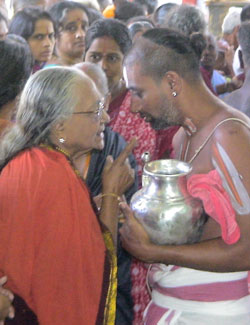 The Dept. of Culture Studies and Oriental Languages (IKOS),
University of Oslo, invites to a presentation of its Kanchipuram Research Project on Tuesday 27 October 2009, 12.15–16.00. This long-term research project in the fields of Ritual
Studies and Indian Studies is headed by Prof. Ute Hüsken at IKOS, and has the subtitle ”Initiation, Priestly Ordination, Temple Festivals – Ritual Traditions in
the South Indian Temple City of Kanchipuram”. All interested are invited to discuss and comment on ongoing sub-projects, hoping for
stimulating intellectual input. The following sub-projects will be presented:
The Dept. of Culture Studies and Oriental Languages (IKOS),
University of Oslo, invites to a presentation of its Kanchipuram Research Project on Tuesday 27 October 2009, 12.15–16.00. This long-term research project in the fields of Ritual
Studies and Indian Studies is headed by Prof. Ute Hüsken at IKOS, and has the subtitle ”Initiation, Priestly Ordination, Temple Festivals – Ritual Traditions in
the South Indian Temple City of Kanchipuram”. All interested are invited to discuss and comment on ongoing sub-projects, hoping for
stimulating intellectual input. The following sub-projects will be presented:
– M.D. Muthukumarasvamy (Director of the National Folklore Support Centre,
Chennai): ”Social Imaginaries of the Divinities: Selves, Spaces, and Simulations in
Kanchipuram Tiraupati Amman Temples”;
– Kerstin Schier (PhD researcher, IKOS); ”Rivalry and harmony: negotiating gender relations in myth and ritual”.
– Ute Hüsken (Professor for Sanskrit, IKOS): ”Initiation and Ritual Competence: Becoming what one already is”.
If you like to participate, please register by sending an e-mail to Prof. Ute Hüsken. Venue: University Campus, Administration Building, 10th floor, Rådssalen, Oslo.
More information on the Kanchipuran Research Project.
 • Uppsala seminar with Kumi Naidoo
• Uppsala seminar with Kumi Naidoo
Uppsala Centre for Sustainable Development (CSD)
invites to a thought-provoking lecture with
Dr Kumi Naidoo (photo),
Former Secretary General of Civicus,
incoming Executive Director of Greenpeace International
and Chair of the tcktcktck campaign. The seminar will be held in Uppsala on Wednesday 28 October 2009, 17.30–20.00. Dr. Naidoo, currently a guest researcher at CSD, will give a presentation entitled ”Snow is melting on Kilimanjaro and water rising in Bangladesh.
Is there room for global justice within sustainable development?”. Venue:
Room X, University Building, Uppsala. More information.
• India born Professor of Music lectures in Malmö and Lund
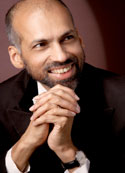 André de Quadros, Professor of Music and Chair, Department of Music Education, Boston University, USA, holds seminars in Malmö and Lund 3–4 November 2009. He will talk about ”Diversity and Richness: How Choirs are Creating Transformation Around the World” at the Academy of Music (part of Lund University) in Malmö on Tuesday 3 November 2009, 14.00–16.30; and at the Dept. of Arts and Cultural Sciences, Lund University on the following day, Wednesday 4 November, 16.15–18.00. The seminars are organised by Körcentrum Syd. Prof. de Quadros was born in India and studied the violin from an early age. He then studied conducting at the Bombay School of Music under the distinguished German conductor, Joachim Buehler. Prof. de Quadros is Chairman of the IFCM’s (International Federation for Choral Music) Multicultural and Ethnic Commission. He is widely regarded as an important figure in the world of multicultural choral music.
André de Quadros, Professor of Music and Chair, Department of Music Education, Boston University, USA, holds seminars in Malmö and Lund 3–4 November 2009. He will talk about ”Diversity and Richness: How Choirs are Creating Transformation Around the World” at the Academy of Music (part of Lund University) in Malmö on Tuesday 3 November 2009, 14.00–16.30; and at the Dept. of Arts and Cultural Sciences, Lund University on the following day, Wednesday 4 November, 16.15–18.00. The seminars are organised by Körcentrum Syd. Prof. de Quadros was born in India and studied the violin from an early age. He then studied conducting at the Bombay School of Music under the distinguished German conductor, Joachim Buehler. Prof. de Quadros is Chairman of the IFCM’s (International Federation for Choral Music) Multicultural and Ethnic Commission. He is widely regarded as an important figure in the world of multicultural choral music.
More information about the Malmö seminar.
More information the Lund seminar.
• Stockholm conference on Women’s Empowerment in Afghanistan
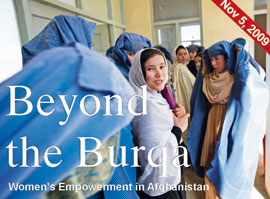 A one day conference entitled ”Beyond
the Burqa. Women’s Empowerment in Afghanistan” will be held in Stockholm on Thursday 5 November 2009, 09.00–16.30. It is organised by the Swedish Committee for Afghanistan (SCA) in collaboration with the Swedish Institute of Foreign Affairs (UI). The aim for the conference is to discuss and learn more about women’s position, life conditions and human rights in Afghanistan. Invited Swedish and Afghan guests and experts will discuss and illuminate new perspectives on the work for women’s human rights in Afghanistan.
A one day conference entitled ”Beyond
the Burqa. Women’s Empowerment in Afghanistan” will be held in Stockholm on Thursday 5 November 2009, 09.00–16.30. It is organised by the Swedish Committee for Afghanistan (SCA) in collaboration with the Swedish Institute of Foreign Affairs (UI). The aim for the conference is to discuss and learn more about women’s position, life conditions and human rights in Afghanistan. Invited Swedish and Afghan guests and experts will discuss and illuminate new perspectives on the work for women’s human rights in Afghanistan.
The conference seeks to answer questions such as: – Is it possible to see Islam as a tool for development?; – How does the conflict affect women’s lives?; – What can be done to change gender traditions and social restrictions on women’s lives?
Preliminary Speakers include Farid Hassanzadah, Human Rights and Gender Deputy Coordinator, SCA; Dr Kamela Sair, Mother and Child Health Care Technical Officer, SCA; Ann Wilkens, former Swedish Ambassador to Pakistan, now President of SCA; and Dr Jonas Svensson, School of Humanities, Växjö University. During lunchtime, the documentary film Twenty-Five Per Cent will be shown, a portrait of six women MPs in Afghanistan by film maker Diana Saqib. Deadline for registration is 30 October 2009. Venue: Drottning Kristinas Väg 37, Stockholm. More information.
Business and Politics
• Employment Visas needed instead of Business Visas
Foreign nationals working on projects/contracts in India now require Employment Visas. They are no longer allowed to stay in India on Business Visas. On 20 August 2009, the Government of India issued a letter through the Ministry of Commerce and Industry, Department of Industrial policy and Promotion, clarifying Visa requirements in respect of foreign personnel executing projects/contracts in India. A subsequent clarification was issued by the Ministry of Home on 25 September 2009. The new regulations state that Business Visas henceforth will be issued only to foreign businessmen who want to visit India for any bonafide business purpose, such as to establish an industrial/business venture, or to explore possibilities of setting up an industrial business venture in India. More information (as a pdf-file)
• Information about South Asia related business and politics in Sweden
See SASNET's page, http://www.sasnet.lu.se/polbuss.html
South Asia related culture in Scandinavia
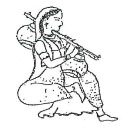 • Kathak performance and workshop in Copenhagen
• Kathak performance and workshop in Copenhagen
Indisk Musikforening in Copenhagen organises concerts with renowned Indian musicians and dancers throughout the year. On Friday 23 October 2009, at 20.00, the Kathak dancer Baishali Bagchi from Kolkata – on her first tour to Europe – will perform at Ansgarkirken, Mågevej 33 in north-western Copenhagen. Ms. Bagchi will be accompanied by the Tabla player Soumitrajit Chatterjee, also from Kolkata. On the following day, Saturday 24 October, a Kathak workshop will be held in Copenhagen. More information (in Danish, as a pdf-file).
• More information about South Asia related culture
in Sweden and Scandinavia
See SASNET’s page, http://www.sasnet.lu.se/culture.html
New and updated items on SASNET web site
• Swedish departments where research on
South Asia is going on:
Constantly added to the list of research environments at Swedish
universities, presented by SASNET. The full list now includes 258 departments,
with detailed descriptions of the South Asia related research and education
taking place! Go to http://www.sasnet.lu.se/environment.html
ƒ Department of Geology, Lund University
ƒ Department of Molecular Biophysics, Lund University
• Useful travelling information
Look at http://www.sasnet.lu.se/travelling.html.
Updated travel advises from the The British Foreign & Commonwealth
Office about safety aspects on travelling to the countries of
South Asia.
Best regards,
Lars Eklund
deputy director/webmaster
SASNET/Swedish South Asian Studies Network
SASNET is a national network for research, education, and information about South Asia based at Lund University. Its aim is to promote a dynamic networking process in which Swedish researchers co-operate with researchers in South Asia and globally.
The SASNET network is open to all the sciences. Priority is given to interdisciplinary cooperation across faculties, and more particularly to institutions in the Nordic countries and South Asia. SASNET believes that South Asian studies will be most fruitfully pursued as a cooperative endeavour between researchers in different institutions who have a solid base in their mother disciplines.
The network is financed by Sida (Swedish
International Development Cooperation Agency) and by Lund
University.
Postal address: SASNET – Swedish South Asian Studies Network,
Scheelevägen 15 D, SE-223 70 Lund, Sweden
Visiting address: Ideon Research Park, House Alpha 1 (first floor,
room no. 2040), in the premises of the Centre for East and South
East Asian Studies at Lund University (ACE).
Phone: + 46 46 222 73 40
Fax: + 46 46 222 30 41
E-mail: sasnet@sasnet.lu.se
Web site:
http://www.sasnet.lu.se
SASNET - Swedish South Asian Studies Network/Lund
University
Address: Scheelevägen 15 D, SE-223 70 Lund, Sweden
Phone: +46 46 222 73 40
Webmaster: Lars Eklund
Last updated
2011-05-19
